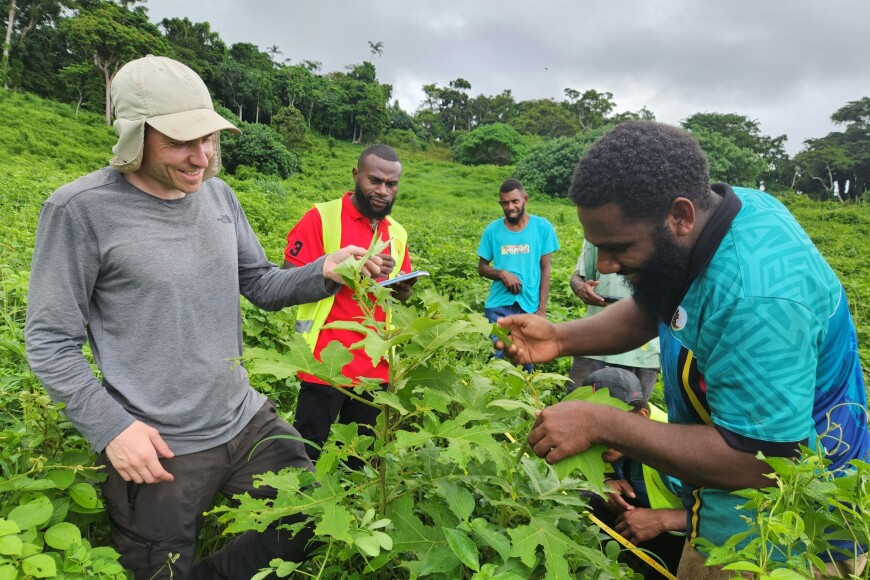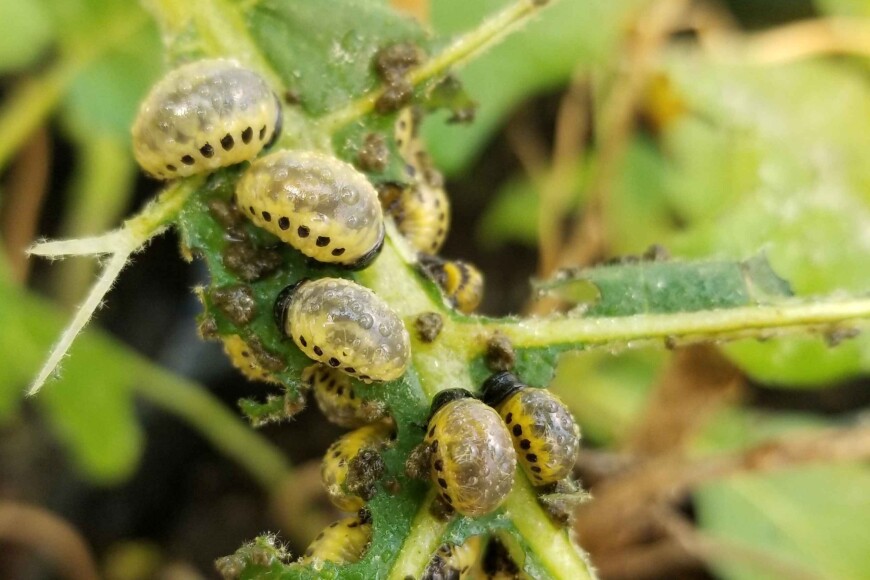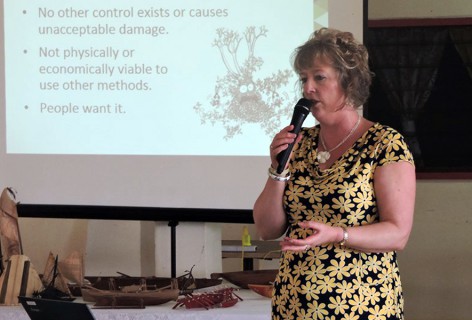
Zane McGrath, Senior Technician at Manaaki Whenua (left), and the Vanuatu Biosecurity team conducting foliage assessment survey at the pico beetle release site in Efate.
Prickly solanum is a thorny shrub or small tree with broad, hairy leaves. It overtops most herbs, grasses, and shrubs, limiting the growth of other species. The weed produces attractive berries that are rapidly dispersed by birds. It has long posed a serious problem for farmers, particularly in cattle-grazing regions, where its thorny structure and toxicity make it unsuitable as fodder. The plant’s rapid spread has forced some farmers to reduce livestock numbers or abandon parts of their grazing land.
The pico beetle, native to Jamaica, is the first natural enemy ever released globally to target prickly solanum. Both the adult beetles and their larvae feed on the leaves, effectively stripping the plant and allowing pasture to regenerate. Our researchers have spent five years studying the beetle and determining its suitability to deploy. “This release is of great significance for Vanuatu, where it was recently estimated that 34 percent of grazing land is lost to weeds. The most important pasture weed is prickly solanum, which was ranked the worst, or second worst weed on 81 percent of farms,” says Dr Quentin Paynter, who leads the Vanuatu Weeds Programme. “The release of the pico beetle will mean a natural enemy has now been released for three of the four worst pasture weeds in Vanuatu.”
This release builds on previous introductions, including the nail grass psyllid (Heteropsylla spinulosa), and the hibiscus bur lace bug, which was released on Efate in July 2024, Santo in November 2025, and Malekula in April 2025. The pico beetle was also released on Malekula in April. Work on wild peanut (Senna spp.) is still in progress. The PRISMSS NENS team has recently conducted follow-up monitoring at the release sites on Efate and Santo, reporting some promising results particularly for the pico beetle. At multiple sites, significant feeding damage both from adults and larvae was observed, with the invasive weed heavily defoliated. At the hibiscus bur release sites, early indications of lace bug presence were also recorded. White specks at the centre of the leaves made it easier to spot eggs, larvae, and adults on the underside.
Further follow-up surveys are planned for November 2025 to assess the level of establishment. If successful, the project could serve as a model for other Pacific nations facing similar challenges, strengthening the region’s resilience through sustainable biocontrol solutions.

Pico beetle larvae, Leptinotarsa undecimlineata
Natural Enemies – Natural Solutions (NENS)
Manaaki Whenua is the technical lead for the Secretariat of the Pacific Regional Environment Programme’s (SPREP) Pacific Regional Invasive Species Management Support Service’s (PRISMSS) Natural Enemies - Natural Solutions (NENS) programme. NENS reduces the vigour of widespread weeds through reuniting them with safe natural enemies from their original homeland. The NENS programme initiatives empowers Pacific communities by improving the health and well-being of all living things and ecosystems.
PRISMSS is a coordinating mechanism designed to facilitate the scaling-up of operational management of invasive species in the Pacific. PRISMSS brings together experts to provide support within the Pacific region with a focus on protection of indigenous biodiversity and ecosystem function. As a service provider, PRISMSS provides a comprehensive suite of support services in a cohesive, effective, efficient, and accessible manner to Pacific Island countries and territories.


